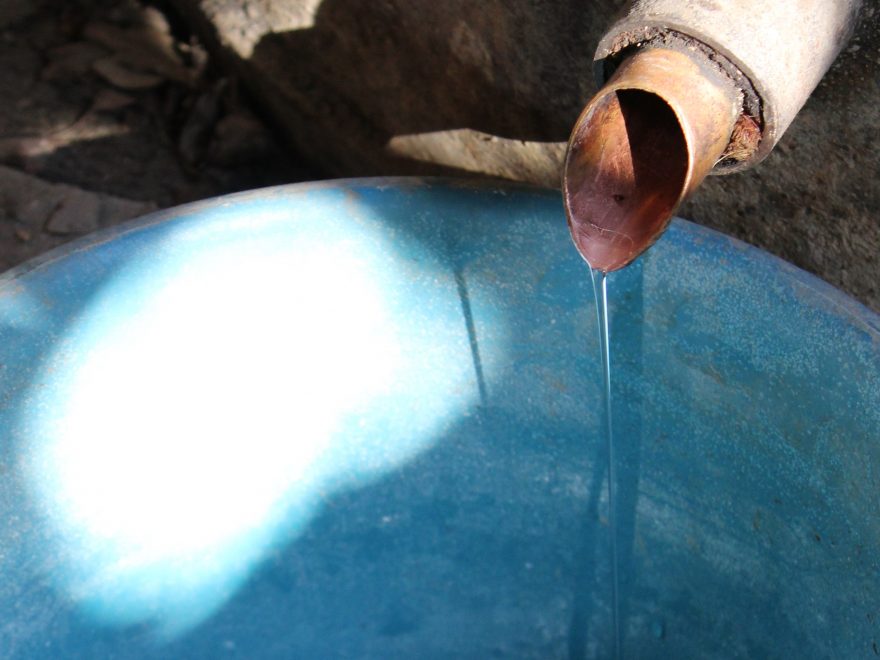According to the Artsakh Statistical Service, more than 500 tons of vodka was produced in Artsakh between January and November 2019. To put it another way, this makes roughly 3.6 liters of mulberry vodka produced annually for every resident of Artsakh.
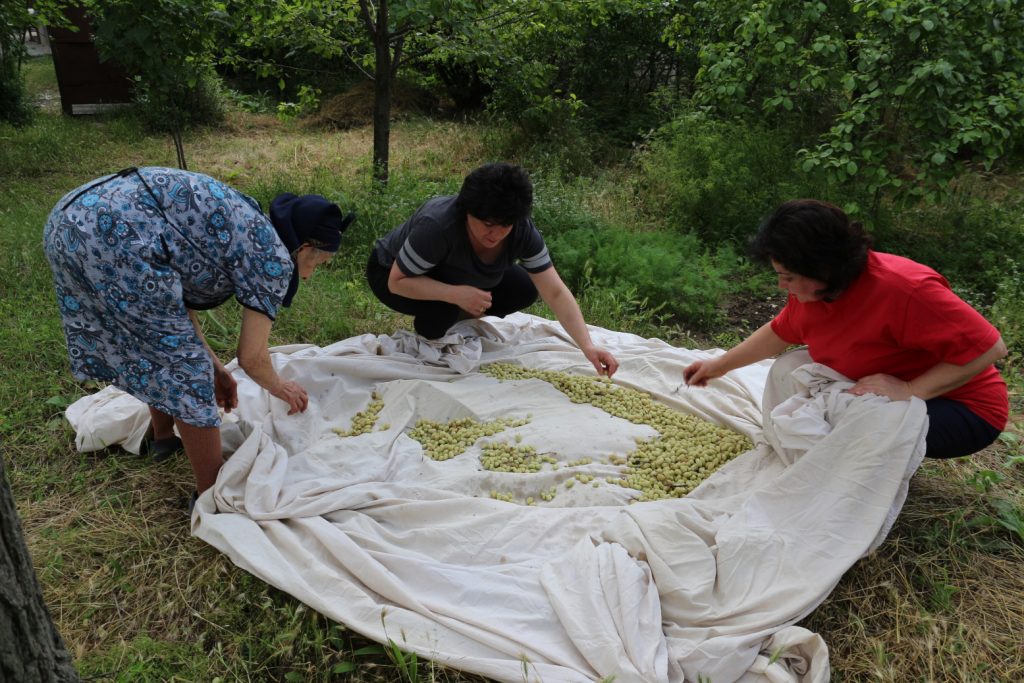
But these are only the numbers from officially registered companies.
There are no statistics on how many tons of mulberry vodka are distilled each year by Artsakh’s households. It would not be a stretch to say that almost every household in the village that has mulberry trees in its garden distills mulberry vodka.
It turns out that the distillation and consumption of this 58-65% strong vodka made primarily from white mulberries has become a way of life for the people of Artsakh.
Air, mulberry and spade
This is how the people of Artsakh explain their key to living a long life.
“Come and live here, breathe some fresh air for one week, get up early, and drink one glass of mulberry vodka. And if you do not like vodka, eat some mulberries on an empty stomach, then drink tea with jam and get to work. The people of Karabakh do not rest”.
Many believe that coming to Artsakh and refusing to taste Artsakh’s mulberry vodka is disrespectful to local residents. Artsakh’s number one fruit vodka has become its own distinct brand.
Despite being quite a strong drink, mulberry vodka is a part of the daily life for the people of Artsakh. What is breakfast without vodka?
Yakov Altunyan from the Mets Tagh village in the Hadrout region says, “That oatmeal thing is a total lie. A softly boiled egg and a glass of mulberry vodka is a sacred breakfast for the people of Karabakh.”
But times have changed and new ideas have come to Artsakh.
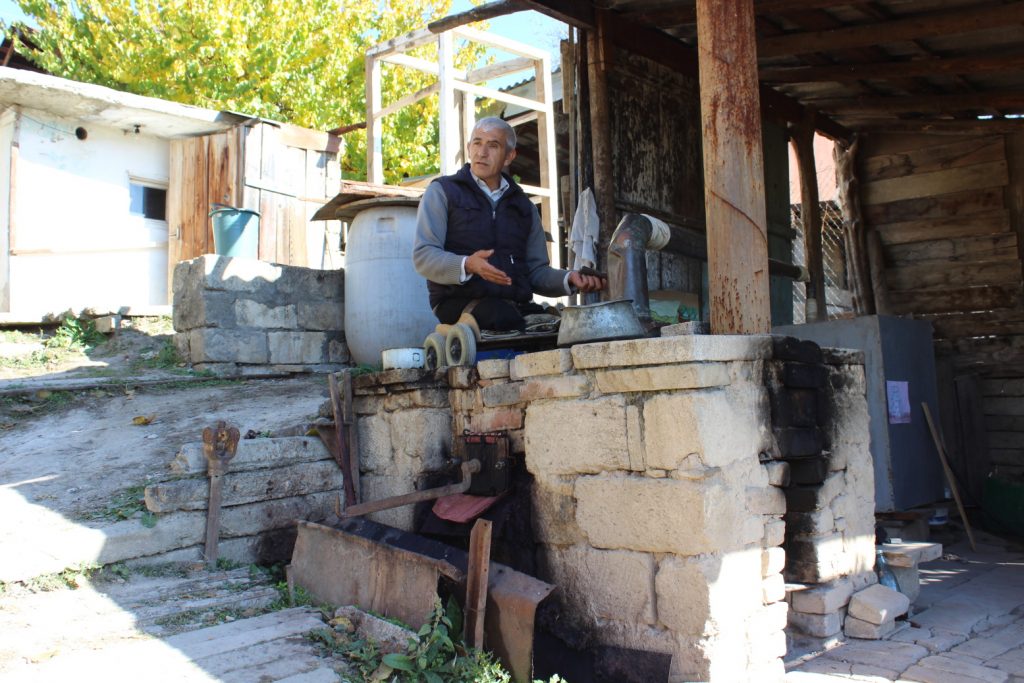
“In older times, a guest was greeted with a glass of vodka, and this never prevented him from working. Nowadays, a cup of coffee is the gesture of hospitality,” says 53 year-old Yakov Altunyan, famous wine and vodka distiller, with a smile on his face.
The fine art of mulberry vodka distillation
– It is flowing, bring the bowl!
– Garik, quench the fire, it is coming!
– It is coming, bring the glasses, the vodka is coming!
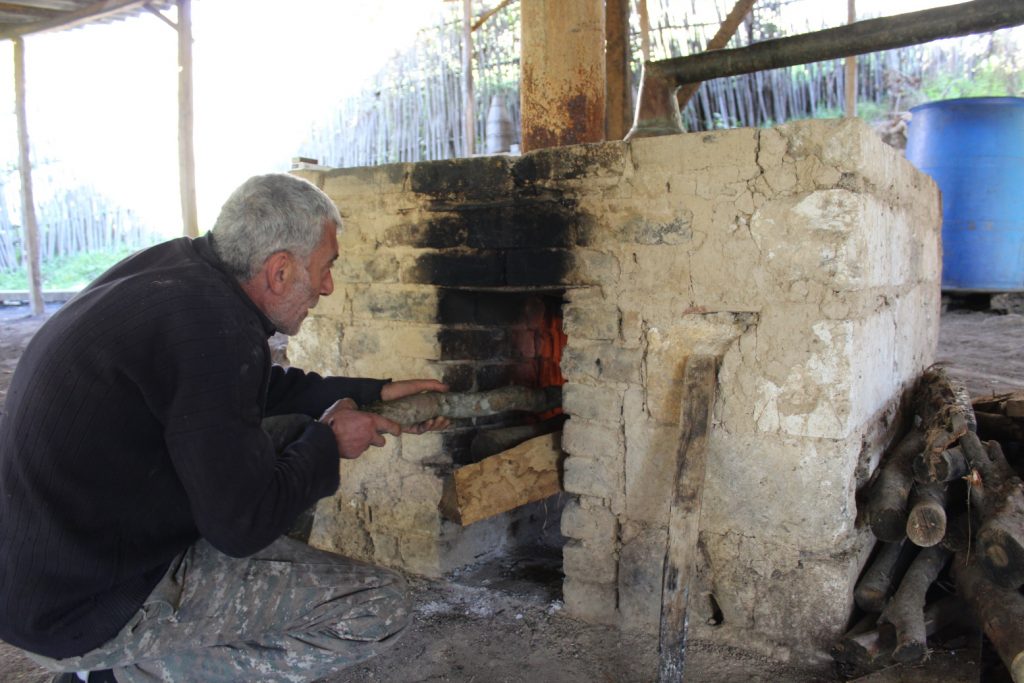
The home of Kichan village resident Arto Hakobyan is a mess. The family members rush to the garden. Some carry glasses and others carry large containers. The gate door slams; the neighbours have arrived.
Usually by the end of the May, the noise of the “thacki” (thick wooden device used for shaking fruit trees) and people picking mulberries is heard from every corner of the village.
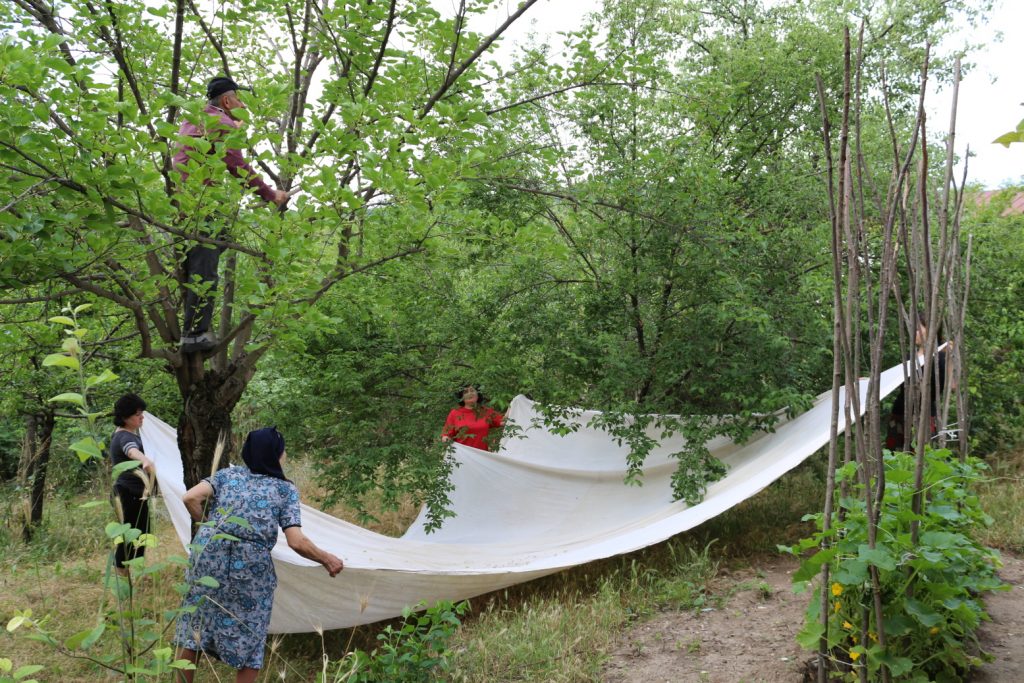
– This is a bad branch, keep it inside.
– Spread the sheet underneath…
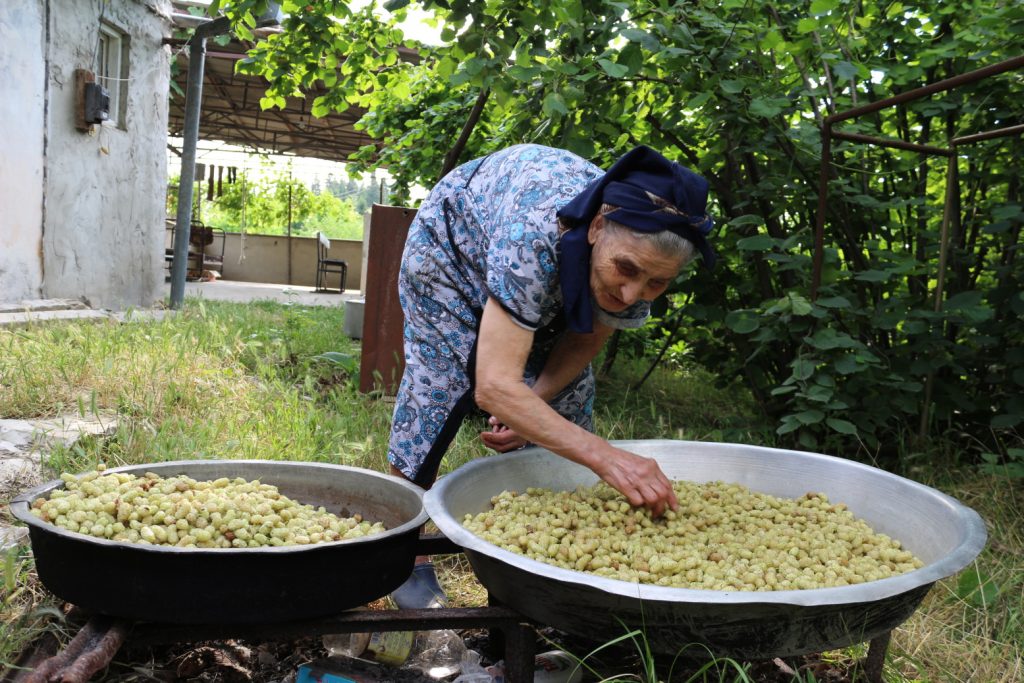
They collect the mulberries from the sheet and from the ground, remove the fallen dry branches and leaves, squeeze the mulberries and pour the mulberry juice into large containers. They stir it several times a day until the fermentation process begins. Then they seal the containers with airtight lids and put them in a cool place. Pre-treatment lasts 10-15 days, depending on the sweetness of the mulberries.
“The traditions of vodka distillation in Kichan have not changed much over the years,” says 56 year-old Arto Hakobyan from Kichan.
The only thing that has changed in the distillation process in Artsakh in recent decades is that wooden barrels have been replaced by plastic containers. The distillation system itself and the copper boiler in which the raw material is cooked have remained unchanged.
Putting the boiler on the fire, Arto tells us how important every detail is in the vodka distillation process.
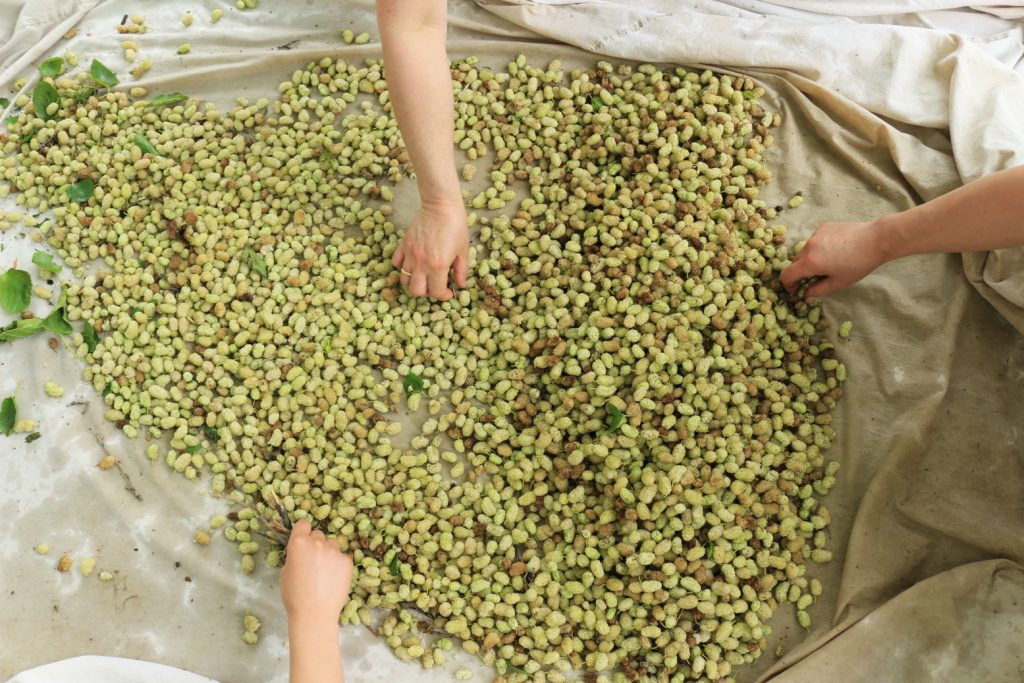
“If there are a lot of mulberries and we know that distillation will take a long time, we cover the walls of the boiler with ashes from the outside. We also put some dough on the edges of the boiler so that the steam does not come out”, – explains Arto Hakobyan adding that, “The boiler where the raw material is cooked must be made of copper. The pipe that comes out of the boiler should always be kept cool. Otherwise the vodka will stink.”
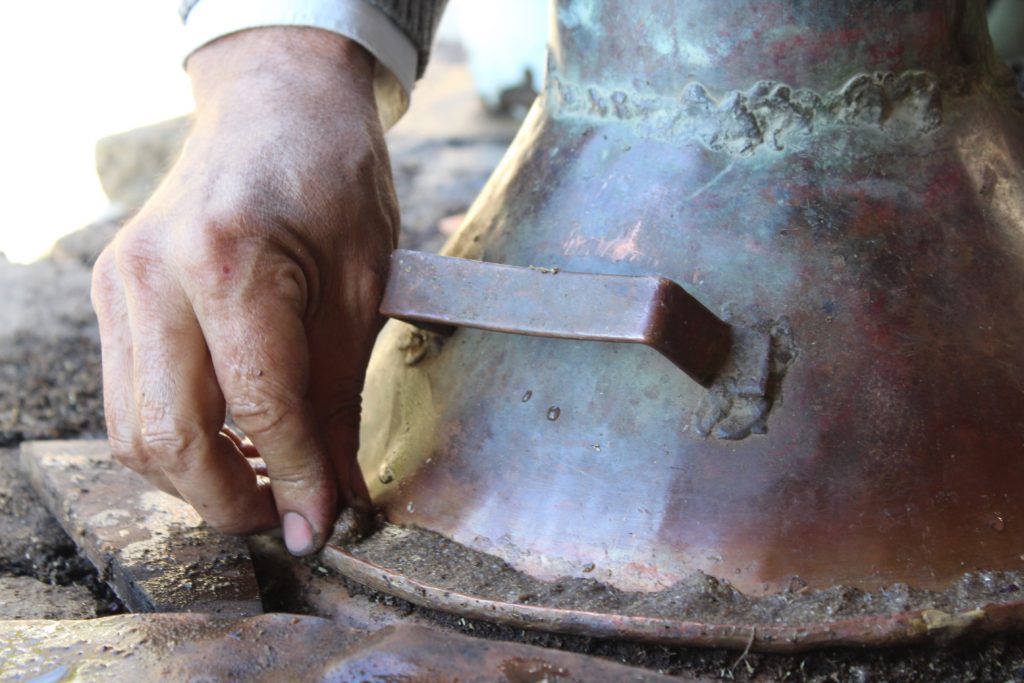
Vodka is distilled from early morning until late at night, sometimes all night, especially when the fruit is in season.
“You don’t get pure vodka with one distillation. The first product is usually impure and has low alcohol content. We call it “jreda” or “paso.” Then we wash the pot well and distill the vodka a second time, then it comes out like a baby’s tear, it is true vodka,” says Arto Hakobyan.
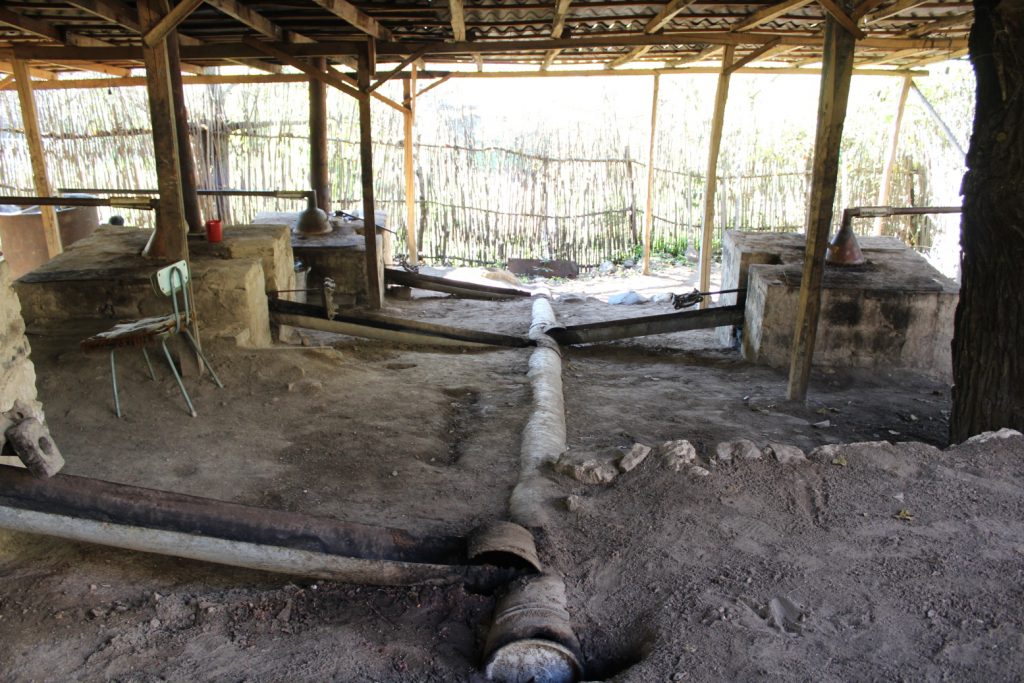
But this is not the end of the distillation process. After that, they begin to measure, mix and then measure again. The strength of vodka is usually measured with a special device, but Artо is used to doing it the old fashioned way, i.e. measurement by eye.
“You pour vodka into a glass, cover it with the palm of your hand and shake it several times. Holding the glass straight, you will see bubbles on the vodka. We determine the strength of the vodka by the length of the chain of bubbles,” Hakobyan explains.
People here are sure of one thing: vodka distillation is the job of older men because it requires patience, experience and wisdom that come with age…
Armenian homemade bread, a piece of cheese and a can of pickles. In northern and southern Artsakh alike, mulberry vodka tasting traditions remain unchanged. Toasts from grandfathers have also not changed much: ուրխութու հարկավեր կյա, “let there be joy”.
Mulberry vodka as first aid
Karine Kamalyan, a 62-year-old woman from the Norshen village in the Martuni region, always keeps a bottle of mulberry vodka and a jar of honey on top of the small wardrobe in her bedroom.
“I do not take any medicine; my medicine is mulberry vodka and honey. If I have a headache, I wet my forehead with vodka. For a sore throat, I put a cloth soaked in vodka and honey across my throat. It is especially good against the flu,” says Karin.
Although her family don’t understand this self-treatment, they would never dare to remove the bottle of vodka from her room.
Kamalyan claims that many years ago, mulberry vodka helped heal her gastric ulcer.
“When I was a student, I had a stomach problem. It was gastritis, and I decided to treat myself using folk medicine. I drank a glass of mulberry vodka every morning,” she says.
Karine doesn’t waste as much as a drop of vodka. When vodka is left in her guests’ glasses, she uses the remnants to clean her porcelain chandeliers and the kitchen furniture. The vodka both shines and disinfects them.
Afterwards, the clean furniture and chandeliers give off a smell of mulberry and alcohol for several hours.
Vodka as a business
Saro Saryan has helped his father distil vodka since he was nine years-old. At that time, he had no idea that years later it would become a family business.
“My father took me to the vodka factory in our village, where I followed the distillation process with great interest. Then I got a job there myself,” says the now 50 year-old Saro Saryan from the village of Mets Tagher in the Hadrout region. Today, Saro runs a small workshop near his home.
There are 6 vodka distillers in the open-air workshop. Barrels of raw materials, vodka containers and bottled products are carefully laid out in the courtyard and basement of the house.
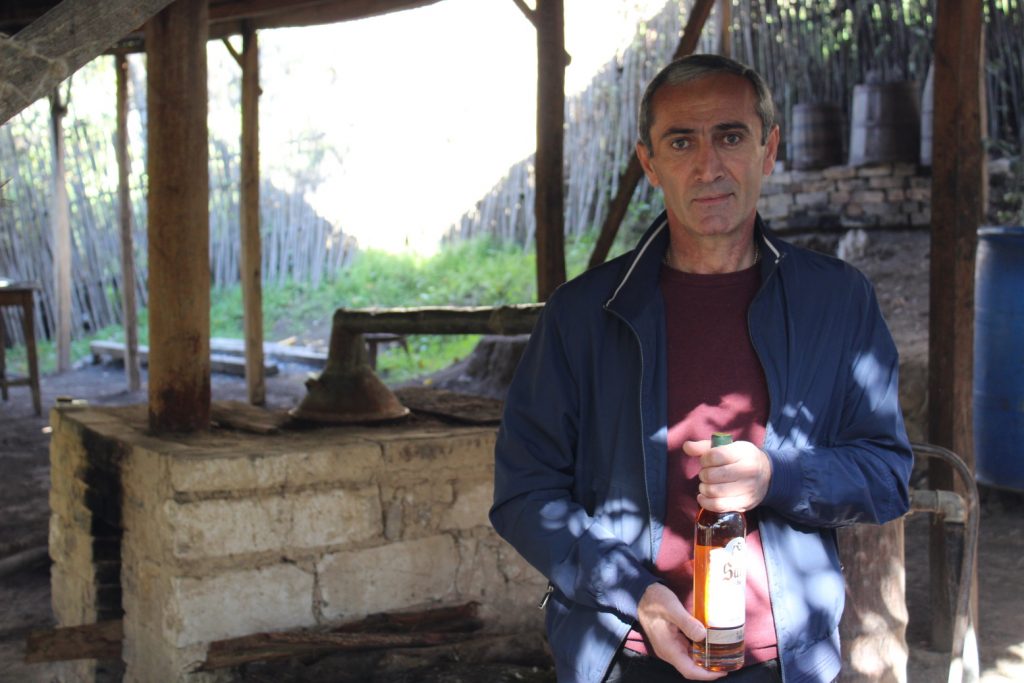
“The raw materials are provided by about 200 residents of the surrounding villages. This cooperation has existed for several decades and is a source of income for both me and them,” says Saryan, noting that he processes about 3 tons of mulberry vodka annually.
This is less than one percent of the mulberry vodka produced in Artsakh.
Over the years, all of Saro’s family members got involved in the small business.
His wife, two sons, daughter and grandchildren are involved in the distillation process. In addition to family members, there are also employees.
The period of vodka distillation in the Saryan family lasts almost the entire year, depending on the amount of the raw materials.
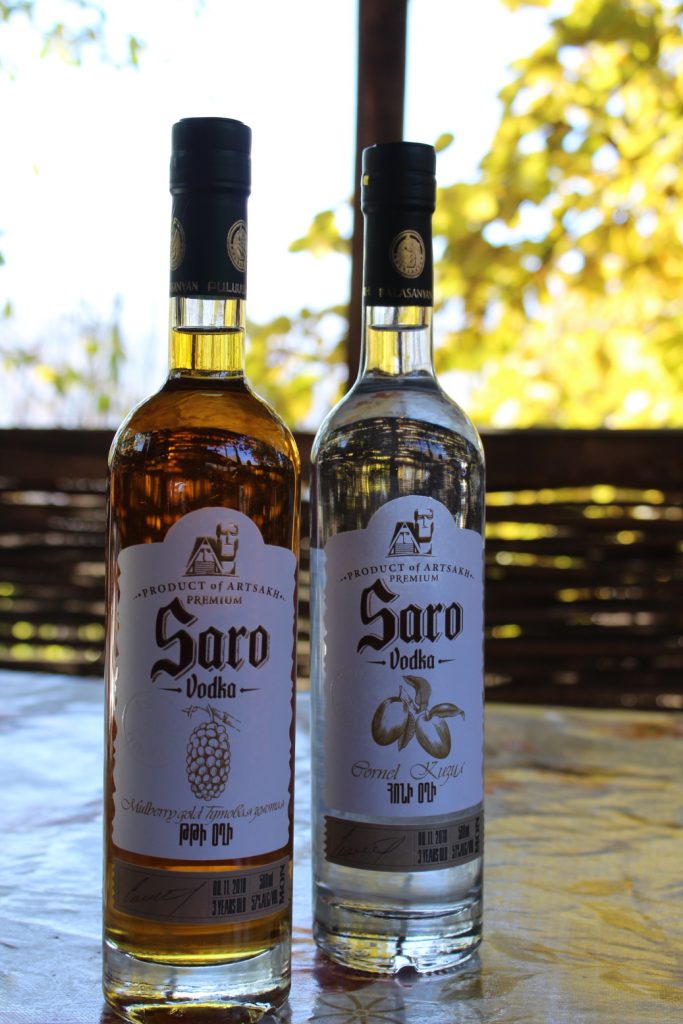
“I have no problems with selling, I have regular customers, both local and from other countries. I used to sell vodka by the litre, but starting this year, it is getting bottled and will soon be found in stores under the name “Saro””, – he says.
Artsakh officially produces mulberry vodka at 3-4 large factories. However, there are many people like Saro Saryan, Yakov Altunyan and Arto Hakobyan. It is difficult to say whether their longevity, good spirits and kindness are due to the air, mulberries and hard work as claimed by the Artsakh recipe to living a long life. But one thing is clear: mulberry vodka, whether produced in factories or individual distilleries, is in great demand and will always find its consumer.
The authors:
Susanna Avanesyan
Knar Babayan
Lusin Tevosyan
